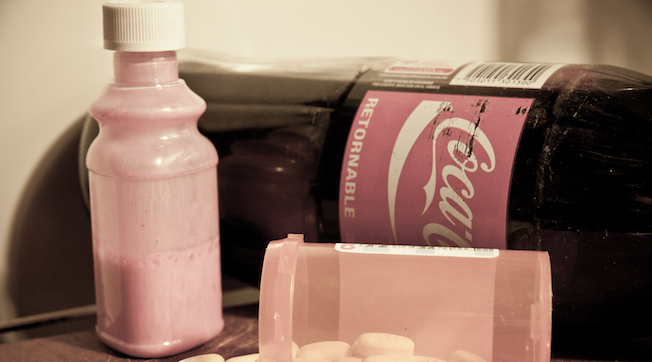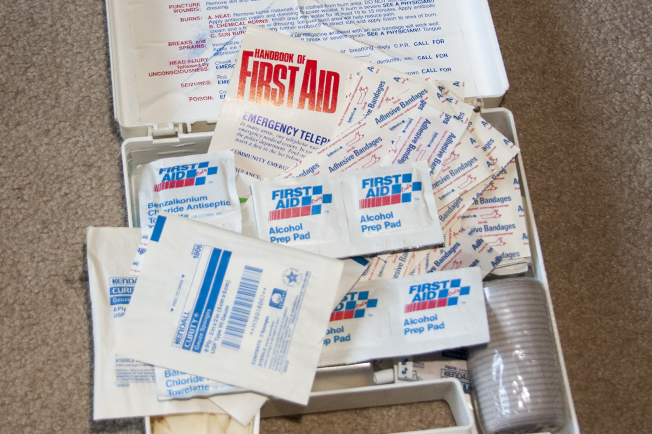Before I left on my two-week dream excursion to Western Europe, my boss had one piece of advice for my first trip to Europe: “Watch out for that French food. They love their rich sauces and butter.” She was right—the French coat everything imaginable with creamy, delicious sauces. My boyfriend teases me that I am overly sensitive to food, and he is right, too: my stomach can’t quite handle the greasy, fried foods that most young people in their twenties enjoy. I have made a point of eating healthier since graduating college; however, this new healthy lifestyle was going to be left back at home. In Europe, I was determined to eat what I wanted, when I wanted, sensitive stomach be damned!
After consuming everything from the four basic Western-European food groups—cheese, meat, bread, and beer—David and I halted our binge in the Louvre. There, we hoped to find a quick, simple lunch. I ordered what I assumed to be a cheap alternative to the rich and extravagant French dishes: a chicken sandwich. Baguette, cold white meat chicken, hint of mayo, and lettuce. By “cheap,” I mean 8 euros, which trust me, is cheap for Paris. Especially compared to the fondue-and-champagne birthday dinner to which my boyfriend treated me the evening prior.
After filling up on our easy lunch, we commenced our 9-hour Louvre visit. But, among the Egyptian ruins, mummified cats, and pages from the Book of the Dead, I was already starting to feel tired. It had only been a few hours so I dismissed it as travel fatigue (this was the last day of our whirlwind trip) and carried on. I was not about to miss any of the artifacts from one of my favorite historical eras! So, despite the occasional audible complaint from my stomach, we saw the mysterious Mona Lisa, the gorgeous Venus de Milo, and more paintings of Jesus than could fill the Notre Dame.
As our full-day Louvre excursion continued, David remained enthusiastic but I was drained and found it impossible to find the energy that had kept me going through Versailles, sightseeing in Berlin, an 8-hour drive through the German countryside, and Oktoberfest in Munich. I kept having to sit down to take breaks on every bench we passed and build my energy to move through a museum that is rumored to take weeks to explore.
After a solid nine hours in the museum, David and I set off to find the Metro station, and stopped by a corner brasserie for dinner. We were scheduled to fly back to the States the next day, so I wanted my last fill of traditional French food. I ordered a rare steak, pommes frites, crème brûlée, and a glass of Bordeaux. I was going to eat what I damn-well pleased and work off the inevitable weight gain later.
We were back in our hotel room by 8 pm and, within an hour, I was complaining of nausea and had a pretty nasty stomach ache. After taking some Pepto Bismol (a necessity if you plan to eat and drink your way through Germany and France), I was not getting better. Another hour later, I was vomiting.
David was our pillar of strength—and I say “our” because dealing with your significant other’s food poisoning is no cake walk for either of you—through the next 24 hours, which would prove to be my worst case of food poisoning to date. (Which is really saying something: when one is born with a delicate stomach like mine, one is prone to overdramatic food poisoning episodes, like the time I got food poisoning from eating a veggie burger in middle school. Yes, that’s right—a burger patty comprised of vegetable matter gave me food poisoning.) Anyway, once we realized I could not keep one sip of water down, I started worrying about the effects of dehydration. My mom, a registered nurse who has been to the emergency room with a bad bout of food poisoning, was our first call. We spent 46 euros (about $62) to call her back in California on our hotel room telephone at 2:30 am (no, we didn’t have a calling card, and no, we weren’t about to go hunt one down at 2:30 am). She confirmed that my symptoms were, in fact, the result of food poisoning and warned David not to let me get any more dehydrated. Dehydration is the primary concern for anyone with this kind of food poisoning (the vomiting kind), because the effects of dehydration usually warrant a visit to the emergency room. From then on, our chief concern was to keep me hydrated enough to avoid going to the E.R., where they would give me an I.V. for the fluids that were refusing to stay in my system. At one point during the course of that night, I simultaneously begged David to make sure I didn’t get dehydrated and not to force me to take another sip of water. Yes, I was a mess, but at least not a hot one—thankfully, I wasn’t running a fever. Dehydration plus fever equals a certain and expensive trip to the hospital.
When the vomiting wasn’t easing up at all, we realized I still needed medical attention and since we were trying to avoid the E.R., David and the hotel clerk contacted an on-call doctor who was available to make the last-minute house call to our hotel room at 3 am, for the low, low price of 110 euros (about $147). This angelic, Parisian woman with lovely dark features came into our hotel room with a real-life version of the doctor kit that I played with as a kid: stethoscope, thermometer, blood pressure cuff, and briefcase adorned with vials of prescription drugs. After asking for my age, known allergies, and what I had eaten the day before and when, she opened her briefcase, pulled out a needle, and prepped an injection. Now, I’m usually perfectly okay with needles; I am devoted to my yearly flu shot. But, given my incapacitated state, I became uncharacteristically worried about the chance of a rouge air bubble left in the vial and of my doctor’s ability to practice medicine at 3 am. In my haze, I remember asking what the mystery vial contained, and she responded with the prescription name of an antiemetic, to help with my vomiting and nausea. I have no idea whether her response was in English or French: I don’t speak a word of French, and her English was coupled with a heavy French accent—so, to this day, I have no idea what she injected into my body. I felt another wave of nausea come over me, so I shrugged my shoulders, looked at my adoring boyfriend for support, ignored the fact that she never snapped on a pair of latex gloves, and willingly handed her my arm.
That doctor’s visit cost 110 euros, cash only, payment on the spot—a fact that I somehow managed to ignore until she was done treating my symptoms. The “cash only” caveat being an issue since, between the two of us, David and I had roughly 65 euros on hand that was supposed to get us through our final day in Paris. But the wonderful doctor with the miracle injection that promised to make me stop vomiting needed to be fairly compensated for her time! David walked down to the hotel front desk, for the third time that night, and asked to borrow the remaining 45 euros with a promise to pay him back once the banks opened and David could withdraw the cash. Thankfully, the grumpy front desk attendant begrudgingly agreed.
I vomited a few more times but, finally, whatever the doctor administered kicked in and I had stopped by the time the sun came up. I was in no shape to eat solid foods, but I needed to ingest something that would increase my blood sugar and energy. David left the hotel room on a mission to find Coca-Cola, pick up medicine prescribed by the doctor, and—most importantly—get cash. What David didn’t prepare for was the fact that, during our dream vacation out of the country, his debit card had expired. This meant he was unable to retrieve cash from any source. My poor boyfriend walked back to the hotel room to get my debit card and face a not-so-forgiving version of his helpless girlfriend. By the time he returned with the soda, pills, and cash, I was worn down to the point of tears, and David was exhausted.
While the original plan was to hop on the Metro to Paris Orly Airport, there was no way that we could coordinate that effort with my sick ass and our four bags of luggage. With the remaining cash from David’s morning ATM trip, we spent 80 euros (about $106) for a cab ride that far exceeded our original plan of a 3 euro each Metro ride. But, we made it to the airport: broke, weak, and grateful for each other.
And when I got back to work a few days later, after arriving safely in the States, I was able to tell my boss all about our unforgettable trip.

